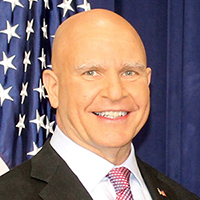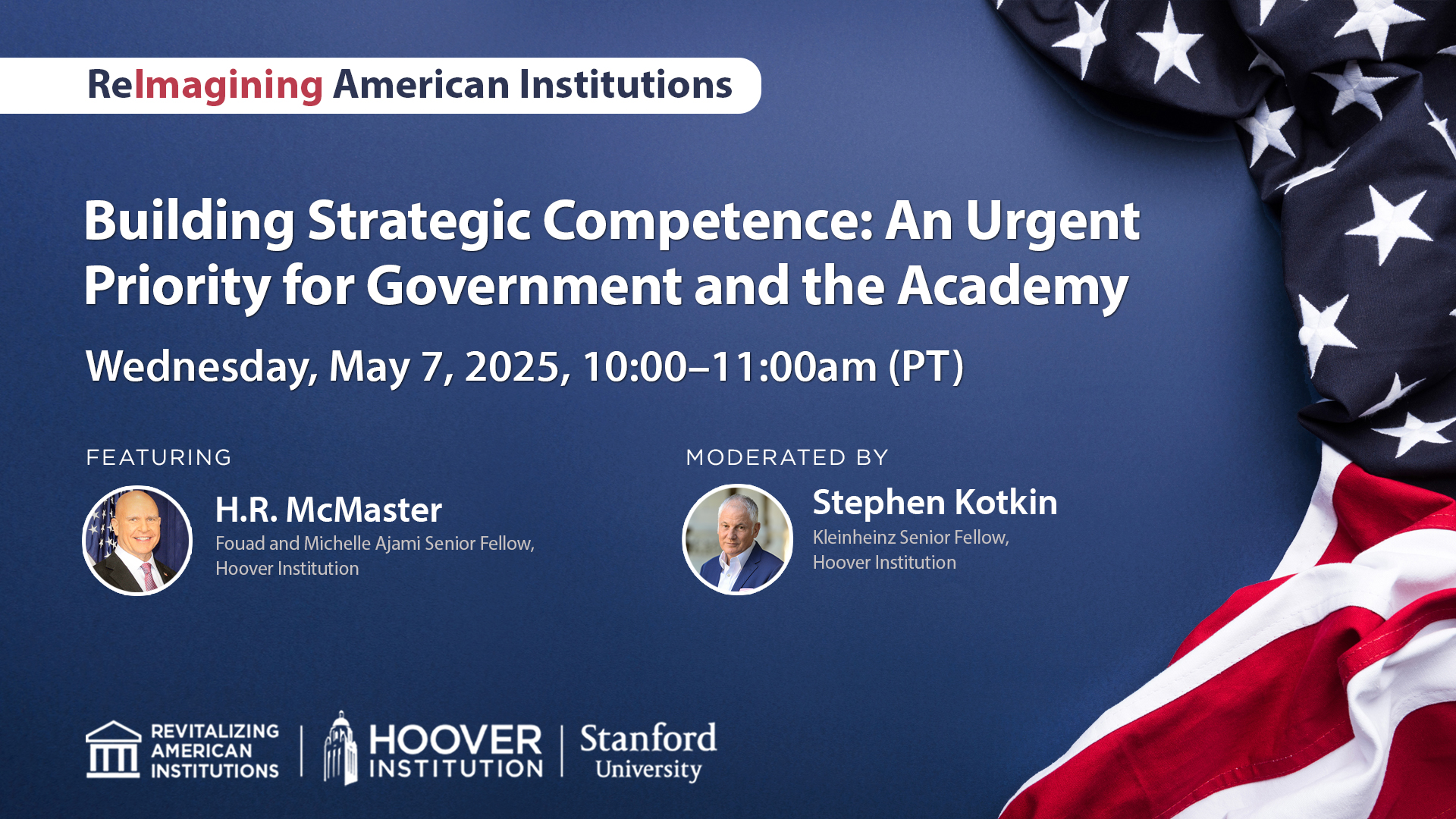The Hoover Institution Center for Revitalizing American Institutions webinar series features speakers who are developing innovative ideas, conducting groundbreaking research, and taking important actions to improve trust and efficacy in American institutions. Speaker expertise and topics span governmental institutions, civic organizations and practice, and the role of public opinion and culture in shaping our democracy. The webinar series builds awareness about how we can individually and collectively revitalize American institutions to ensure our country’s democracy delivers on its promise.
The seventh session discussed Building Strategic Competence: An Urgent Priority for Government and the Academy with H.R. McMaster and Stephen Kotkin on Wednesday, May 7, 2025, from 10:00 - 11:00 am PT.
We might define strategic competence as the ability to integrate all elements of national power and efforts of like-minded partners to advance US interests. The nation needs leaders who can think in real time and understand what it takes to implement ideas and strategies on the ground. The academy has an important role in educating leaders to compete effectively in war and in competitions short of war. A reinvigoration of history in higher-level education is particularly important, as many courses in diplomatic and military history have been displaced by theory-based courses, which tend to mask the complex causality of events and obscure the cultural, psychological, social, and economic elements that distinguish cases from one another. Some theories risk sapping students of strategic empathy and encourage them to reduce complex problem sets into frameworks that create only the illusion of understanding. A growing interest in applied history in some universities is a promising development.
WATCH THE WEBINAR
>> Eryn Tillman: Hello, my name is Eryn Tillman, an Associate Director at the Hoover Institution, and we'd like to welcome you to today's webinar organized by the Hoover Institution center for Revitalizing American Institutions, also known as rai. Today's session will consist of brief opening remarks from our panelists and facilitated discussion with our moderator, followed by a period where our panelists will respond to questions from audience members.
To submit a question, please use the Q and A feature located at the bottom of your zoom screen. We will do our best to respond to as many questions as possible, and a recording of this webinar will be available@hoover.org rai within the next few days. Rai operates as the Hoover Institution's first ever center and is a testament to one of our founding principles, Ideas Advancing Freedom.
The center was established to study the reasons behind the crisis and trust facing American institutions, analyze how they are operating in practice, and consider policy recommendations to rebuild trust and increase their effectiveness. RAI works with and supports Hoover Fellows as well as our faculty, practitioners and policymakers from across the country to pursue evidence based reforms that impact trust and efficacy in a wide range of American institutions.
Today is the final webinar in our 20242025 Reimagining American Institutions series. We'd cover topics related to executive transitions, trust in elections and polling, the climate for conservative students at college campuses, and last week we explored how restrictions on speech in other countries impact Americans right to free expression.
Today our conversation turns to the role of the academy and particularly those engaged in teaching applied history and educating future leaders. It gives me great pleasure to introduce today's moderator, Stephen Kotkin. Stephen is the Klein Heights Fellow at the Hoover Institution, as well as a Senior Fellow at Stanford's Freeman Spogli Institute for International Studies.
He's also the Berkeley professor in History and International Affairs Emeritus at the Princeton School for Public Policy and International affairs, where he taught for 33 years. He earned his PhD at the University of California, Berkeley and has been conducting research at the Hoover Institution Library and Archives for more than three decades.
Stephen Co leads the Hoover History Lab and his research encompasses geopolitics and authoritarian regimes in history and present day. Thank you Steven, for moderating today's discussion. I'll turn it over to you to introduce today's guest.
>> Stephen Kotkin: Thank you Eryn. It's great to be here and I have the great honor to introduce my good friend and colleague General H.R. i woke up early this morning at 5:30 to begin rereading his biography and I didn't finish and those were just the highlights.
HR McMaster is the Fouad and Michelle Ajami Senior Fellow here at the Hoover Institution at Stanford University, among many other distinguished affiliations.
>> HR McMaster: He was on track to become a globally renowned rugby player, but he gave up the fame and glory of sport to enter public service.
>> Stephen Kotkin: After graduating from the US Military Academy, he earned a PhD in military history from University of North Carolina, Chapel Hill.
He currently serves as chairman of the War Studies Department at West Point. Alongside his Hoover appointment, General McMaster spent 34 years in the U.S. army, and he served in command positions leading our forces in Iraq and Afghanistan. He wrote what remains an indispensable book on the Vietnam War, Dereliction of Duty, whose lessons have only increased over time.
He served as national security Adviser to President Trump during his first term and wrote another indispensable book about that tour of duty in government. He is an accomplished impersonator, but he chooses only to impersonate very obscure subjects, which is perhaps why this remarkable talent of his is not better known.
He hosts an important and timely podcast at Hoover called Battlegrounds, which is also the title of yet another book of his and which should help inform today's webinar on developing strategic culture for our next generation leaders. General HR over to you. I'm thrilled to be here with you.
>> HR McMaster: Hey, Stephen. It's great to be with you, somebody who I admire and I'm so grateful to be your friend and your neighbor up there in the Hoover Tower. But I've learned so much from you over the years. And what I'm hoping is this will be a conversation where both of us will contribute to the answer to this question of how do we restore our strategic competence and therefore confidence, confidence in our institutions of government and the ability of those institutions to achieve good outcomes for the American people.
Because I think we really do have a dearth of confidence these days, Stephen, where we're, you know, we really don't have faith that our government can advance our interests effectively abroad, whether in war or in competitions, you know, short, short of war. And I think where that comes from, and I'll try to be like brief here, but, but is a neglect of history.
You know, I, I, I really, you know, you know, hashtag predictable for us two historians will probably agree on this, right? That, that it is, it is ignorance of history which I think oftentimes lends itself or creates the conditions for folly in foreign policy and in war and in particular, I think the neglect of history and the associated atrophy in, in, in academia in terms of the, the Ability to study diplomatic and military history in particular, has led to a kind of prevalence of.
Of social science theories, which are useful and important to, to, you know, to. To interdisciplinary study of war in the context of programs like a war studies program. But I think if you don't study history and instead you study these theories, that it, it creates kind of a.
A veneer of understanding, and it encourages students, graduates to try to fit these complex challenges that we're facing in the world into the theory. Instead of, as we learn, as historians, ask the question, what is the nature of the challenge associated with the Chinese Communist Party? And then be sensitive to the complex causality of events, which is what history really helps you gain is that kind of sensitivity.
And I believe also that the study of history is an exercise in humility because you can see how others, you know, smart people typically can run at difficult challenges and oftentimes fell short, you know, because. Because of maybe sometimes the intractability of problems, the limits of agency that we often have over some of the complex challenges we're facing.
So, you know, I think the number one recommendation here that's consistent with this awesome program that we have at Hoover on revitalizing American institutions is to revitalize the study of diplomatic and military history in the academy. And, and to do so in a way that kind of eschews these, you know, you know, kind of, you know, postmodernist approaches to the study of history and tries to understand, you know, understand historical events and, and, and trends on their.
On their own terms. So I think what I like to do is just relate quickly my own experience in coming into the job of National Security Advisor, quite unexpectedly, and how the study of history informed what we tried to achieve for President Trump in the period2017 to 2018.
I cover this a little bit in the book. But, in February of 2017, I'm walking down Walnut street in my hometown of Philadelphia. Go Phillies, and as I'm on my way to brief out this study that we had done on Russian new generation warfare, and my job at the time was to design the future army, we took an historical approach to that.
We modeled our study of Russia's invasion of Ukraine in 2014 and their broader campaign of what we're calling Russian new generation warfare of political subversion, the use of assassinations, cyber naval information warfare, cyber attacks, all those range of activities that Russia engages in to try to accomplish objectives below the threshold of what might elicit a concerted response to this Russian aggression.
And we modeled this study off the study that General Don Starry had done of the 1967 war in Israeli Arab war in 1967. And he brought an interdisciplinary team to try to distill out of that experience the lessons that were important to the development of the future Army.
So we put this interdisciplinary team together. And then I was briefing out this study when my on my way to brief it out when my phone rang and said, hey, will you come to Mar A Lago and interview for the job as National Security Advisor? Well, as I was reflecting on, well, am I up for this job?
I thought about my previous experiences in the Army. But what I was most grateful for, Stephen, was the opportunity to read, study, research and write history at the University of North Carolina in my master's and PhD program there. And the question I took on was how wide did Vietnam become an American war?
And what were the roles of President Lyndon Johnson's principal civilian and military advisors in the decisions that led to an American war in Vietnam, mainly between Kennedy's assassination and the Noen Diemku and the July 65 decisions. And in the process of writing that dissertation, which became a book, I became a student of the national security decision making process in the post World War II period.
And then at West Point had the opportunity to teach, to teach a survey course, two semesters of military history and a course called the History of the Korean Vietnam Wars. And what this I think allowed me to gain an appreciation for were how different presidents made decisions, how they structured their decision making processes, what the various roles and how the roles were similar and different between various national security advisors.
And so when I get hired on President's Day, you know, Monday at Mar A Lago, fly to Washington, didn't live in Washington, but start work the next day in the White House, I took out a legal pad and just wrote down what I thought were the five main lessons of Vietnam War decision making.
And the first of these were take more time to think about the nature of the challenges we're facing. And this is where history and the academy can equip students to think holistically about complex challenges to security or vital interests. The second of these was that it's really important to have a clear goal and objective in mind and to take time crafting it.
You might think, well, that sounds kind of obvious, but McGeorge Bundy had concluded in this period of time that I was studying today, it's better not to have an objective in Vietnam because that way, if the President doesn't accomplish it, it will give him more flexibility in the domestic political arena.
The third key lesson was, and this is a lesson you can also glean from Peter Robin's great book Presidential Command, that it's important to give a president multiple options because, hey, the President's the person who got elected. But it's really in the comparison of these courses of action, these options, you can draw out long term costs and consequences and risk and mitigation and, and so forth.
The fourth key lesson, and this is what's really important, and I think where the study of history is immensely important, is to, is, is to make explicit any assumptions that are underpinning your planning efforts. My experience has been, Stephen, that 90% of the problem with flawed U.S. policies and strategies is implicit assumptions that are fundamentally flawed, but because they're implicit, they never get challenged.
You know, Pakistan, if we're nice to Pakistan, right, And we, and we have sustained aid to them, they're going to really cut off their assistance, you know, for jihadist terrorist organizations and, and help us with, you know, the Al Qaeda and Taliban problem. Well, how did that work out?
You know, China, if China's welcomed into the international order, China will play by the rules and it's China prospers, guess what? They'll become just like us, the CCP will liberalize its economy and liberalize this form of governance. How did that one work out? Vladimir Putin, what he really needs is he needs his security concerns allayed and then everything will be okay.
And so, these are the kinds of assumptions that underpin policies across multiple administrations, right? And then, finally, I kind of alluded to this already. It's really important to try to insulate policymaking processes from what can distract you from your purpose and in particular, partisan political considerations. Because Lyndon Johnson really, hey, he saw Vietnam principally as a danger to his goals.
Of getting elected in 1964 and passing the Great Society in 65. And what he didn't want to do is entertain any option that might jeopardize really support from constituencies on which that domestic agenda depended. So I'll just stop there. I wanted to provide an illustration for us maybe now to have a conversation about, you know, how do we invigorate the study of history.
And I'd like to just ask you what your thoughts are on the overall subject as well as any reaction to that intro.
>> Stephen Kotkin: That's great, General. If only we all had that yellow pad in front of us every day. We need to put that in the Hoover library and archives and get it up digitized on the website.
Taking more time, having clear goals, multiple options, making explicit those assumptions, and insulating from the partisan politics. The irony of Johnson, of course, is everything was subordinated to partisan politics in decision making, in foreign policy, and it didn't work because he gave up running for reelection in the end precisely because of some of the decision making that you cover in your dereliction of duty books.
So you think you're doing one thing, but you're doing the opposite in this perverse and unintended consequences kind of way. Talk a little bit for us about the difference between strategic and tactical, not just on the military battlefield where it's really, really critical, but also in this policy formation, decision making process.
You alluded to taking more time, taking, having a clear goal. So I can already see a differentiation implicit there in strategic and tactical. Make that explicit for us, following your own prescription.
>> HR McMaster: Okay, well, you know, first of all, it's important to really just have in your own mind a working definition of strategy.
Right. Everybody wants a strategy for everything now. Right? You want to buy a car? Well, I need a strategy to buy a car. You know, and, and, and, and our colleague Hugh Strahan, one of the greatest, I think, military historians of his, of his generation, if not the greatest, you know, he kind of took the mantle, I think, from Michael Howard in terms of just the most accomplished and insightful military historian.
He said that the meeting of strategy has become banal, right? Because everybody wants strategy for everything. I think what differentiates strategy from a plan is the complexity of the environment. And competition, opposition, rivals, right? Because what that does is it creates a degree of uncertainty that that means you can't just have a plan like to build a bridge or something, right?
That you know that there are going to be unforeseen occurrences, circumstances you're gonna have to react to. And so therefore you have to kind of elevate your perspective and, and come up with just a broader concept that does what, you know, the army taught me when I was a lieutenant on the definition of strategy is a strategy is ends, ways and means.
Beginning with what you want to achieve in the ends, then the ways are very important. How you have to answer the question, how do we get to that objective? And then you can determine from that the means that are necessary for you to be able to, you know, integrate all elements of national power and efforts of like minded partners to accomplish the overall objective.
And I think that's kind of the essence of strategic competence is your ability, you know, to, to actually understand complex problems, to visualize, right. How you get from where you are today to the accomplishment of your, of your ends. And what happens a lot of times, Steven, is that like if there's not a strategy, people substitute tactics for the strategy and they tend to then centralized decision making.
When I first got into the job as National Security Advisor, I said, hey, please give me a list of all of the authorities and decisions that have been centralized at the White House level, the president's level, away from the departments and agencies. The list was, was really long, and made no sense to me.
Like anytime, we're gonna sail naval vessels through the South China Sea, you had to get permission. I'm like, hey, last time I checked, China doesn't own the ocean. Why are we doing that? You know, or we can only have three Apache helicopters in Syria at any one time.
Well, why is that? Why is that? You know, so, so I think what both of those examples reflect is that we did not have a strategy in place to deny China's claim that they own the South China Sea, right? We didn't have a strategy in place to accelerate the defeat of isis, ensure the enduring defeat of isis, and then have some kind of a vision about how we could incentivize over time a resolution of the Syrian civil war.
And so if you don't have a strategy for that, then what you do is you begin to centralize decisions because you want control, right? If you have a good strategy in place, a good strategy should help make you feel comfortable with relinquishing control. And allow you to supporting organizations, departments, agencies, support to the president to take initiative and to implement that strategy.
>> Stephen Kotkin: Empowering others. Why appoint good people if you don't empower them to do their job?
>> HR McMaster: Exactly.
>> Stephen Kotkin: Talk a little bit about sometimes what I call junk history. So it's clear that some, some of us don't know enough of history. Yeah, that's of course, on US Educators.
When we complain that people don't know history, it's not their fault, it's our fault. To be better educators, to make it more interesting, to show its relevance in their decision making, in their own strategies. I see a lot of history that I would call junk history. And sometimes the junk history is worse than complete ignorance of history.
So for example, in the case of China, there was an historical theory that we did this with Germany, we did this with Japan, we did it with South Korea and Taiwan. So we know how to do this. That is to say, if you engage and they liberalize their economy, they can also begin to approach the kind of politics of a classical constitutional order with rule of law.
And see, we know this playbook from those other cases. The problem is that playbook didn't apply to the Eurasian landmass empires who had a different history. The case of China, the case of Russia, the case of Iran, right? For them, they predate the existence of the United States by at least the millennium and in some cases in the China case, more than that.
And they have their own sense of how international order should look and what their trajectory might be. And so we had an historical playbook that we were applying, but it wasn't the history that I myself would have chosen for the Eurasian land mass empires. And also when we have all the analogies at hand, Munich, Vietnam, and I could go on, you know this well, when people throw these analogies around.
So talk a little bit not just about ignorance of history, but about the junk history that either people got wrong or they're applying in the wrong cases.
>> HR McMaster: Right, junk history. Or you might say drunk history. I don't know if you've ever seen that Comedy Central show Drunk History where they typically have grad students in history over, imbibe and then give their, give their version of the, the Napoleonic wars or something.
I mean, it's, it's, it's pretty amusing. But hey, fortunately, a lot of people don't need to get drunk to give us that drunk history. That's right. That's right. So I really, I really like, you know, David Hackett Fisher's book, you know, on, on, on on how history can help you inform decision making.
Because it's so comprehensive, it's kind of dense. You know, it's not really accessible for, you know, for just general readers. But, but, but I think he. He did a very good job of laying out, you know, the application of history, the importance of thinking in time and reasoning by historical analogy, but also pointing out the.
The deficiencies. And, of course, Margaret McMillan's much more accessible book, short book called Dangerous Games is also very good. There are some other, like, monographs, like, I forget the author's name, darn it. I think it was a Columbia history professor called Analogies at War about the Vietnam War and the overuse of the Munich analogy and so forth.
So there's a good literature out there, which is actually, I think a great course to teach, you know, in grad school is, you know, the what. What. What Michael Howard called in this great essay, which I always assign to whatever class I teach, the Use and Abuse of Military History, which gets to this point as well.
So you're right. I mean, there are many people who misuse, abuse history, make the wrong historical analogies. Especially, I experienced this, and Stephen, in Iraq and Afghanistan, with, the failed efforts to kind of build institutions there and to transition into a form of governance, to replace kind of the authoritarian, the theocratic dictatorship in Afghanistan or the Bath party dictatorship in Iraq.
And I led a couple of efforts which, again, I think are illustrative of the importance of history to. To try to correct some of those deficiencies. One of those was to. To help rewrite the campaign plan during the surge in Iraq in 2007. And. And I brought, you know, an interdisciplinary effort together.
Stephen Biddle, who is one of the most accomplished, you know, so social scientists, who thinks clearly about war. I mean, he's. I kind of liken him to Dr. Spock. Everything he says is logical. You know, he's a great thinker. But then we brought a historian named Toby Dodge, who, you might know, who is a historian of Iraq and specialized in institutional history in Iraq, which was very important to understand, really, you know, how to help the Iraqis establish, you know, effective governance.
For example, or rule of law, and to rebuild these institutions that have been really kind of destroyed by Saddam because they were turned into his purpose, and reflected his megalomania and brutality. So yeah, I think that understanding the full complexity is what's important. People, of course, they grasp for facile, analogies to oftentimes shop around for the history that will support.
Yes, that will support their, you know, what they want to do. And that's always dangerous. Right. It's like a pilot shopping for weather. You know, hey, if the weather's bad, you don't want to fly, you know, and, and, and so I think we have to be on guard about this.
But this is what we could teach students too, right? Is, Is, you know, how to reason by historical analogy while, while being cognizant of the potential pitfalls of doing so and provide them with examples and then help them, help them identify their own examples. As Michael Howard called it, the use and abuse of history.
But I'd love to hear your thoughts on this. How do you think about what history can and can't do or shouldn't try to do?
>> Stephen Kotkin: I think it's really important to practice the scientific method. I mean, that sounds banal and it's a cliche, but for me, the scientific method is actively seeking evidence that disproves your hypothesis, that disproves what you want to believe, that disproves that you're sure what is right.
And so it might well be that you don't find evidence that disproves what you want to believe, and therefore it is true. But if you're not actively seeking evidence to contradict your hypothesis or your cherished beliefs, really your convictions, what you want to be true. If you're not actively doing that, you're not seeking the scientific method.
So if you go out there proactively trying to disprove yourself, you get to a much better place. Now, it may well be that the evidence is contradictory, the evidence is hard to read, the evidence is insufficient. It's not always the case that we have a preponderance of evidence on all the questions that are before us.
You talked about humility, and it's really important, for sure, history teaching humility. But I think this proactive seeking of evidence that might be contrary to our hunch or to our cherished beliefs, that's something that I found. I didn't have that when I was young. I was quite eager to prove what it is that I wanted to be true.
And it took me some time in a PhD student to develop this and to carry that forward, but it's been with me ever since. And I really feel that if we do that, at a minimum, we go really far.
>> HR McMaster: I'd like to give an example of your work on this.
Your book Uncivil Society challenged what had become the conventional wisdom, right, about the collapse of, of dictatorships in Eastern Europe, the collapse of the Soviet Union. Right. And, and a lot of that was, you know, had, had become kind of, you know, the, the, the foundation for the way we viewed the world and the post Cold War world.
Right. And, and so I, I, I, you know, I, I think that's just such a great point is to, you know, don't accept the conventional wisdom. Sometimes you can guard against that by think, bringing people in with different perspectives, you know, consulting others, asking them to, you know, murder Board or the Red Team, you know, whatever, whatever you're working on.
>> Stephen Kotkin: Explain a little bit for our viewers what Red Team, the con we don't always practice Red Team in academia or what a murder Board is. Tell us a little bit more about those practices.
>> HR McMaster: So a Red Team would be that, you know, you subject whatever you think your, your plan is or the assumptions that underpin your plan to others who would view them skeptically.
Oftentimes a Red Team is, is, you know, looks at the same challenge you're facing from the perspective of your adversary. Right. And, and so there's, there's a good literature on, on this, but I think a book that is, that is really important to, to, to kind of red teaming yourself or giving, you know, entertain the perspective of others is called A Sense of the Enemy by our colleague and a visiting fellow here named Zachary Shore.
>> Stephen Kotkin: Yes,
>> HR McMaster: also I'm very taken with his other book called Blunder, why Smart People Make Bad Decisions. And what he does is in each of those chapters, he tells us is historical vignette up front that illuminates this cognitive trap that you could fall into. And so I think it's also important to, to understand, you know, this is, you know, you understand like, what you don't know about a situation or what might be, like, unknowable about it, you know, and, and, and, you know, I'm thinking of, of when I interviewed General Goodpaster, who I think is, you know, kind of one of the unsung heroes of the post Cold or Post World War II period, a really clear thinker from a strategic perspective, became President Eisenhower's right Hand man in establishing the Eisenhower National Security Council and then later became superintendent of West Point.
Took a demotion after he was the supreme ally commander Europe because West Point was having difficulty integrating women and they needed somebody of his stature, just a fantastic guy. But I interviewed him on, on the Vietnam book. He said they didn't know what they didn't know. Talking about Robert McNamara and others.
And I think again, you know, as you've already highlighted, you know, it's study history should give you a sense of humility whenever you think you know the answer. You know, and, and there's some great examples of military history, right, of, of military officers who thought they had the, the, the answer.
And, and you know, I'm thinking about the French army offensive in 1917 that breaks the army and ends in mutiny, right. Whenever you have a general who says I have the solution, you should start looking for the exit.
>> Stephen Kotkin: Problems are always more complex than we'd like them to be.
But you know, you don't always have full information in real time. Historians, we look back at our cases and we have a lot of information from many different points of view. Decision makers in the moment and especially people looking forward, hoping for some strategic decision that has positive consequences not just today, but evolving over time.
There's a lot of uncertainty that you're dealing with in those moments. You know, Henry Kissinger in some ways made a career out of discussing the difficulty of decision making under uncertainty. You can't avoid the decision, the problems are immediate, you can't have the full information. So how did, whether on the battlefield, life or death decisions right in, in the, in the White House where the decisions are not always immediate life and death, but can be.
How does one deal with the uncertainty stuff that you're mentioning? Not just failing to understand what we don't know, but lacking critical data and input, but you can't wait for it to come in.
>> HR McMaster: Well, this is, this is a really great topic. Thank you for raising it.
Because I do think that, you know, know to be effective as a military commander in particular, you have to, you have to be comfortable with uncertainty. And I think when military commanders get into, into difficulties is when they want certainty before they make a decision. And that's a recipe for losing the initiative for delaying decisions.
Carl von Clausewitz, you know, who all of us washed up generals have to quote as frequently as possible. He's actually brilliant. He said, having taken into consideration everything that you can learn about a situation, you must march boldly forth into the shadows of uncertainty. And I think what has gotten us off track oftentimes, as we're developing future force capabilities, is we make the assumption that emerging technologies have shifted war fundamentally from the realm of uncertainty to the realm of certainty.
This was the problem associated with kind of strategic bombing, theory in the 1920s. It was the problem associated with the orthodoxy of the revolution in military affairs in the 1990s, which was, in a lot of ways, I think, a setup for the difficulties that we encountered in Iraq and Afghanistan.
And it's coming back. This is what I called an essay years ago, the Vampire Fallacy, because you can't kill it. And now it's AI-related technologies and supercomputing that really, really this time is gonna shift war into the realm of certainty. And then once you make that assumption, right, war's gonna be certain.
Well, guess what's most important after that? Well, then you better, you're gonna have the perfect plan, perfect information, perfect plan. If you have the perfect plan, what you want to do is centralize authority. You don't want anybody doing their own stuff, that you want them to execute that perfect plan.
And then if you're centralizing all of that, what's most important is synchronization, not initiative. And you can see how you can create a culture also that expects certainty. And then you now have a cultural deficiency in your military. You've been optimized for certainty. It's a disaster. So this is, I'm thinking of Robert Doughty's great book The Breaking Point on Sedan, and then also The Seeds of Disaster, kind of a companion volume where he compares and contrasts French doctrine and German doctrine in 1940.
And the fundamental assumption was the French commanders would be what they called at the handle of the fan in these bunkers. Because, hey, the telegraph and wire communications, it shifted more to the realm of certainty. So we've been down this path so much, and this is where I think history can help inform us in a way that helps us avoid pitfalls, right?
I'll give you a couple other examples. I think studying battle is really important so you understand the nature of battle, because that hasn't really changed a whole heck of a lot. I mean, John Keegan in the book The Face of Battle, which I love this book, because it shows the importance of what Sir Michael Howard advocated, which is studying warfare in width, right?
It says warfare in width, depth and context. And so this is warfare across, I think it was like five centuries, wasn't it, Stephen? I think five centuries or four centuries in the same geographic spot in Belgium. And then he explores how technology evolved the character of warfare. But in the end, and there's a great paragraph in the end of the Face of Battle where it says what battles have in common is human.
The struggle of men and of course, women now, struggling to reconcile their instinct for self-preservation with the achievement of some aim over which others are trying to kill him. And then he says, what battle ultimately is, is. It's aimed at the disintegration of human groups. I read that when I was a lieutenant, and you know what I thought?
I'm gonna make sure my human group never disintegrates. And what I'm gonna do is I'm gonna build confidence as a bulwark against fear and disintegration. And whereas you might focus on specific tactics, techniques, knowledge, skills and abilities of soldiers as you're training, I always had that in mind.
I'm instilling confidence to make sure we can disintegrate our enemies in battle, but they can't disintegrate us. And so it's those kinds of conclusions that shape your thinking that I think are so important associated with the study of history. Otherwise you would do what you would do as a junior officer, right?
You would do your gunnery and maneuver exercises and training, but you wouldn't have that context of what are we really trying to achieve.
>> Stephen Kotkin: We often focus on territory, territorial gains and losses. You're talking about the will to fight and the capacity to fight and maintaining one's own and attacking the enemy's will to fight and capacity to fight.
There's a lot of stuff in there. There's the decision making loop and many other aspects that are important. But fundamentally, whether you lose territory or you hold territory, you have to hold your will and capacity to fight, and you have to disintegrate the opponent's will and capacity to fight.
That's sorta what the nub of the gist of what you're getting.
>> HR McMaster: Absolutely, which is like continuity in war, right? And so Carl Becker, one of my favorite historians, who had that great essay, Every Man a Historian, he said that memory of past and anticipation of future should walk hand in hand in a happy way.
And I think what happens oftentimes was when you neglect continuity, you focus exclusively on change. And I don't think it was the changes in technology that created problems for us in Iraq and Afghanistan. It was neglect of continuities in the nature of war, war's political and human dimensions.
>> Stephen Kotkin: Yeah, we're getting some really good questions in the chat here about whether wars are winnable anymore and how we go about fighting and winning wars. People are talking about the experiences that you had firsthand, Afghanistan and Iraq. Explain to us a little bit about the nature of war and your understanding of victory as well as winning the peace, not only winning the war.
Really big subject, but I can't think of a better guy.
>> HR McMaster: Well, I think we had these fundamentally flawed assumptions about the nature of those wars. And again, and I've written about this in Battlegrounds and in The War With Ourselves, but that these flawed assumptions about the nature of the post-Cold War world were a setup, I think, for the difficulties in Iraq and Afghanistan.
And those assumptions were that, hey, an arc of history. It guaranteed the privacy of our free and open societies over closed authoritarian systems. That great power competition was a relic of the past. But then most importantly, that our technological military prowess, as demonstrated in the Gulf War, would make future wars fast, cheap and efficient.
And we would essentially be able to take what I would call the George Costanza approach to war and just leave on a high note. And so we forgot that, hey, the consolidation of gains has never been an optional phase in war. You don't have to do the consolidation of gains if you're doing a military raid, which is a military operation of limited purpose, short duration and planned withdrawal.
But if it's a war, you've got to get to a sustainable political outcome consistent with what brought you into that war to begin with. There's a great book on this by another one of our colleagues, Nadia Shadlow, called War and the Art of Governance. And I recommend that last chapter for anybody who wants to understand the failure to consolidate gains in Iraq and Afghanistan.
What I saw in both wars, close up in both wars was nobody wanted to do it. It was the consolidation of gains. Some historians knew it had to be done. A guy named Conrad Crane, who's a fantastic military historian, put out this pamphlet in 2003 right before we invaded Iraq.
And he was like, hey, United States Army, you're gonna have to do all these tasks. This is what you've had to do in Panama, Dominican Republic, I would give any example, Civil War reconstruction. You always have had to do this, but nobody wanted to do it again. To your point earlier, Stephen, in large measure because we learned the wrong lessons from Vietnam.
One of the lessons and from the Gulf War. The lesson from Vietnam was we're not gonna do that anymore, right? We're just gonna leave when it's done. General Tommy Franks, after the invasion, Iraq, he went around to every unit. He was saying, take as much risk getting out as you did coming in.
So what happened, I believe, is that both these wars were winnable. I mean, we haven't lost yet in Iraq still. I mean, that's still up for, you know, we'll see how that goes. But you know, I think the short term approach to what were long term problems in both places lengthened those wars and made them more costly.
And, and so I've written more about this in other places to explain that, that kind of interpretation, but it was mainly based on, I think that that war, let's just take Iraq for example.
>> Stephen Kotkin: Yes,
>> HR McMaster: Stage one, ignorance. Ignorance of what it would take to consolidate. I think this was willful ignorance in a lot of ways.
Right. We're just not going to do that and we're going to have the State Department do it. Well, hey, there's no State Department cavalry. They don't exist. They never existed, right? Then we went from into, into denial. I had the opportunity to write many memos for the Central Command commander, General Abizaid, who also used to have Hoover affiliation.
Fantastic guy. To Secretary Rosefeld, hey, we got an insurgency here. He's like, no, don't say the I word. Don't say insurgency. You know, and, and so we had this denial period. And then we had a period where in that period of denial we just wanted to get the hell out.
And then finally we had an adaptation period as a sectarian civil war had morphed onto the, an insurgency that had coalesced and get, and, and, and gotten stronger. So, I mean, I could go on about this. Then we won. I think we won that war, Stephen. You know, and I know it's kind of maybe predictable for somebody who was involved emotionally and, you know, lost 63 of my, of our cavalry troopers in, in, in combat in Iraq to say we won.
But I, I'll tell you, Stephen, in 2010, Baghdad was safer than, you know, any major U.S. city and the insurgency was defeated. And then what happened is we disengaged not only militarily but diplomatically as the Iranians pulled a fast one through the election to Maliki, who then put back into place sectarian policy.
I could go on. I'll just say consolidation of gains was neglected both places. And as a result, you know, we took a short term approach to long term problem sets and those wars got longer and more costly. And then our will was diminished because the American people lost confidence.
And I think our presidential leaders too. I mean, I don't think what the American people need to know about a war is why, why did you know what is at stake and, and what is a strategy that will deliver a favorable outcome at an acceptable cost and risk?
And I think our presidential leaders did a poor job of explaining that in both those wars.
>> Stephen Kotkin: People are asking about not just the consolidation of gains once you're in the war, but the rationale for going into the war in the first place. In other words, once you're in 100% clear, you gotta be in to win.
You're not in a war to lose a war, or else you're irresponsible. But should you go in in the first place? How do we make those decisions as a republic? One of the key points you brought up at the outset, you know, giving the President multiple options, right?
And so, and you lived by that when you were in that office, and we can see it in your book At War with Ourselves. From the time that you were in there, you tell quite a number of stories of setting up a process for multiple options, and then the president who's elected makes the decision and others get in line and implement, right?
That's really important understanding. But what about the decision for war in the first place?
>> HR McMaster: Well, this is a great question. Again, history here, invaluable, right. As Hustron and other historians have pointed out, wars oftentimes turn into another whole different kind of war, right? I mean, they don't end the way that they started oftentimes.
And that's because of the interactive nature of war, right? War's political, war's human, war's uncertain because it is what Clausewitz called the continuous interaction of opposites, which means there's no such thing as linear progress in war ever. And so at the outset of a war or when you're making a decision whether or not to use military force and to enter into a war or an armed conflict, you have to consider that the future course of events depends not just on us, but on enemies who have authorship over the future as well.
And so I think that's kind of a macro level observation. But then you should try to, as best as you can to identify the long term costs and potential long term costs and risks. This was the problem in Vietnam and I wrote about this pretty extensively in Dereliction Duty is, is that there was a tendency just to take, really consider each, each step up the ladder.
And for, for Lyndon Johnson, in retrospect, it looks like, well, I guess he really wanted to get us into that, that to become an American war. No, he, he wanted the opposite, but, but because he was unwilling to entertain the potential long term costs and consequences. He never really considered them and, and, and, and, and wanted to continue to avoid making a tough decision.
So, you know, I think what's important to highlight is not only the risk and cost of action, but the risk and cost of inaction, but also to recommend that. Recognize, you're gonna make mistakes, right? And you might go against whatever your doctrine was. I mean, heck, you know, we had, we had drawn the, the, the Korean peninsula was outside of our sphere of vital interest that we had identified just a year earlier, before the June 1950 invasion.
We had withdrawn all of our troops because we thought it wasn't that important to us. But President Truman had a different idea, and thank God for everybody who lives south of the 38th parallel that he had that idea. Whoever thought we were gonna go to war in Afghanistan, right?
I mean, our, our, our, you know, our track record as, as Secretary Bob Gates has pointed out in predicting the next war is perfect because it's zero, you know, and so, so again, you know, this is where I think, you know, as you face these kinds of decisions about whether or not to go to war.
And this is where Secretary Rice, our director here at Hoover, has great insights because of the post 911 period. You know, the key is to try to anticipate, you know, what are the long term costs and consequences and to always balance the risk of action, which you ought to be clear eyed about as best you can with the risk and cost of inaction.
>> Stephen Kotkin: Yeah, that's the hardest one.
>> HR McMaster: Well, and this is another book. Another book. Another book is, is, is Don Kagan's book on, on the Origins of War and Prospects for Peace. Great. On this topic, I think.
>> Stephen Kotkin: Yes, yes. This is now becoming like a PhD seminar or reading list.
700 pages a week here.
>> HR McMaster: You know, Don Higginbotham was one of my advisors at USC Chapel Hill, you know, and after I took the written exam, he said, Congratulations, H.R. you now know more history than you will ever know. And I think that's true.
>> Stephen Kotkin: Well, sometimes, sometimes we forget things we knew, but it's important to learn them in the first place because you don't forget that we're getting a lot of good questions about Ukraine, Russia and some about China.
So in the time we have remaining, you could maybe apply some of your analytical acumen, your historical background not to where we were on Russia, Ukraine, but where we could be or should be. We have some really consequential decisions in the administration right now. You know, the players personally on this, you're in, in contact with some of them.
Give us a little bit on your analysis of Russia, Ukraine policy, wise options for the president, and then if we have time, we'll do the China piece in conclusion.
>> HR McMaster: Okay, I'll, I'll do Russia really fast because I want you to, I want to hear what you think about this.
And, and anybody who's on this webinar should want to hear more from you on it than me. And, and so I would just say that we made some big mistakes on, on not being able to deter Russia's attack in the first place. Those were based on flawed assumptions about what drives and constrains Vladimir Putin.
Again, this is an argument for strategic empathy. You know, multiple presidents all through President Biden, maybe President Trump again believe that Putin just really needs his security concerns allayed. And they don't recognize the degree to which he is obsessed with restoring Russia to national greatness. And by doing so, really by pursuing some sort of a restoration revanchist agenda associated with restoring the Russian empire to a certain degree, or at least creating servile relationships among countries that would fall into his sphere of influence and he wants to extinguish Ukrainian sovereignty as part of that.
So if you understand the nature of the problems that we're mentioning about and you make your assumptions explicit, I think the assumption is Putin won't stop until he is stopped, until he's convinced that he's losing the war. And the way to convince him that he's losing the war is to impose greater costs on an economy that's failing, but also to communicate long term support for Ukraine, maybe in connection with a long term low interest loan that could allow the Ukrainians to buy weapons from us, know and expand our, our industrial base.
In terms of this framework that I offered, what should the objective be? It should be a, a free, sovereign, secure Ukraine, whatever you can salvage of Ukraine out of a, a ceasefire and agreement that can defend itself. Right. And can get on the path to restoring its, its sovereignty and its prosperity.
And, and of course, there are risks associated with this that you have to mitigate. But I mean, that's the way I think about it. And, and I'd love to hear what you think, what you think, and maybe also about the future of Russia, because, Steven, you've got that great essay on the five alternative futures for Russia.
>> Stephen Kotkin: Yeah. I think it's important to understand what you're saying is Putin is playing for the win. He doesn't want to draw. He's not playing for a draw. He's playing for not just territory in Ukraine, some of which he doesn't even control yet, but subordination of Kyiv to himself to Moscow to the Kremlin, and then eviction of US power from Europe, or certainly the extension of US power post 91, when the former Soviet satellites or republics begged to join the Western alliance and we agreed to accept them in Toronto.
He's playing for keeps. He wants to win, not to draw. Ukraine should have been and is now playing for a draw. They for a while were playing for a win, but that was sort of beyond the circumstances in my view. And I was arguing that three years ago we needed a draw and a draw was a very good outcome for Ukraine.
Sort of like the Korean Peninsula that you were alluding to, where whatever territory Ukraine can control, they should control it fully, not partially, which is what Putin is trying to impose. And it should be reconstructed in a modernist fashion, not rebuilding the stuff that was there, the early 20th century economy that was bequeathed to Ukraine from the Soviet Union.
So playing for a draw is a version of a win for Ukraine. But getting that across was really difficult during the heady days of planning this offensive and that offensive. So now the game is getting Putin to accept that draw, to make him climb down from playing for all marbles here, playing for the win.
And he'll do that if his regime is at stake. However many soldiers he loses on the battlefield, he'll just send more to their deaths. However many points we shave off his gdp, he'll impose austerity on other people, not on himself and his elites. His pain point is political.
It's about the survival of his regime politically. And so if that is put at risk both covertly and overtly, and his attention is clear that it's either agree to withdraw on terms that are more favorable to Ukraine than the ones he's demanding now, or risk losing your regime.
It's 100% clear to me he is going to take regime survival over that. We have not applied that political pressure. We've said it was escalatory. We've applied the pressure on the battlefield. A war of attrition. A larger country against a smaller country and a larger country that doesn't care about loss of life.
That's a hard war of attrition against a country like Russia is hard for anybody, despite Ukraine's courage and ingenuity. We've applied it in the economic sphere, but not as well on the price of oil, which is the most significant pain point by far for him. Nor can we successfully blockade Eurasia to prohibit smuggling and third parties and cutouts delivering all sorts of contraband for his war effort, let alone directly from China.
But we've been playing in the economic space, we've been playing in the military space, we've been ramping up the pressure, and in the political space, the pressure has been minimal or next to nothing. Now, of course, he took a really big political blow in Syria and you were advocating movement on the Syrian front for some time.
That was not us, that was really Turkey and other aspects in the Middle east involving Israel. But you could see where that was a really big blow to him, the Syria one. Again, not something we did, but something we can benefit from. And there are other points of vulnerability that you know well from, from being on the inside.
So that's what I see the move going forward as far as the future of Russia, very briefly, our goal should be a free and democratic Russia ultimately, but that's going to be very hard to do since it really hasn't been the norm there. So in the meantime, we need a Russia that may be nationalistic but retrenches from aggression abroad.
Not because they love Ukraine or any of their other neighbors, but because they fear the cost for Russia of an aggressive policy abroad. So they're Russian patriots who want to pull back for the sake of Russia. And that's our constituency that we have to play to. They may not be Thomas Jefferson, they may not share our values, they may in fact despise America, but they understand American power.
They understand the self defeating trajectory of Russia currently. And so deconflating Russian elites and the Putin regime, peeling off patriotic Russians who again may not be favorably disposed towards Ukraine, no altruism, but are hurting for Russia and therefore think that the war is hurting Russia and should be stopped in the draw that's more favorable to Ukraine.
So that's how I see our strategic options there. I'm not sure I've been getting through with that message very successfully now for the three years, but I've been pretty consistent on that message.
>> HR McMaster: Well, I hope you get through. I mean, it's a critical moment. Thanks, Steven. That's awesome, it's great.
>> Stephen Kotkin: It's a great conversation. We'll have to reserve the China piece for the next one. Although people can go online and on YouTube and all of your amazing podcasts with all sorts of really high level policymakers and discussions of China and not only China on the Battlegrounds podcast as well as the other Hoover programming on China with rich on our YouTube channel.
But I'd like to thank the audience for the excellent questions. And of course, I'd like to thank our general for the lucidity and the learning that he displayed. A lifelong learner, he's referring to books and concepts he's absorbed recently, not just when he was a student. And that's a really big lesson for everybody to learn that you're not done with learning when you're in college, but it's a lifelong process and you should never stop.
I'm going to, at this point, turn it back to our host, Stephen.
>> HR McMaster: I'm in the best learning environment because I get to learn from amazing scholars like you. Thank you so much for the opportunity to be with you.
>> Stephen Kotkin: It's mutual, sir, and we'll do more.
>> Eryn Tillman: Thank you.
>> Stephen Kotkin: Thank you, Aaron.
>> Eryn Tillman: Thank you, Steve, and thank you, HR we really appreciate your time. This recording will be available on the Hoover event webpage in the next three to four days, and that is also where you can find each of the individual webinars for this series.
The events team will include a link to that chat that you can find, and we really encourage you to visit the series webpage to sign up for other sessions that we have access to our recordings of previous webinars and subscribe to our RAI newsletter to receive updates. Upcoming Events thank you again for joining and have a great day.
ABOUT THE SPEAKERS

H.R. McMaster is the Fouad and Michelle Ajami Senior Fellow at the Hoover Institution, Stanford University. He is also the Bernard and Susan Liautaud Fellow at the Freeman Spogli Institute and lecturer at Stanford University’s Graduate School of Business. He was the 25th assistant to the president for National Security Affairs. Upon graduation from the United States Military Academy in 1984, McMaster served as a commissioned officer in the United States Army for thirty-four years before retiring as a Lieutenant General in June 2018.

Stephen Kotkin is the Kleinheinz Senior Fellow at the Hoover Institution as well as a senior fellow at Stanford’s Freeman Spogli Institute for International Studies. He is also the Birkelund Professor in History and International Affairs emeritus at the Princeton School of Public and International Affairs (formerly the Woodrow Wilson School), where he taught for 33 years. He earned his PhD at the University of California–Berkeley and has been conducting research in the Hoover Library & Archives for more than three decades. Kotkin’s research encompasses geopolitics and authoritarian regimes in history and in the present.




















